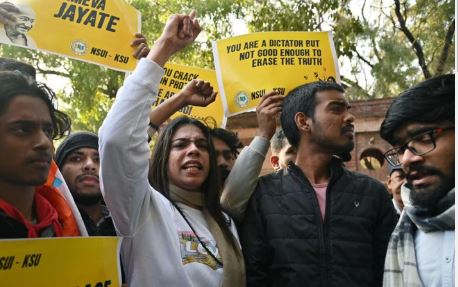RIOTS: There were clashes between the police and students in Delhi University over the screening of BBC documentary.
By Wire Staff
Delhi University, which had taken action against students who organised a screening of the controversial two- part BBC documentary on the Godhra riots and Narendra Modi’s role in them, say punishment to harsh and to please revoke it!
In a letter to the vice-chancellor, 59 signatories, on behalf of the India Academic Freedom Network, said that the punishment given to the students is disproportionate to the alleged violation by them.
A group of academicians on April 6, Thursday, condemned Delhi University for its action on some students who had participated in the screening of the BBC documentary on Prime Minister Narendra Modi, India: The Modi Question.
In a letter to the vice-chancellor, 59 signatories, on behalf of the India Academic Freedom Network, requested the vice-chancellor of Delhi University to revoke the punishment given to the students.
They said that “the punishment given [to the students] is disproportionate to the alleged violation” by them.
“We need not tell you that university is supposed to be a space where students and teachers feel free to get information from any source, decide for themselves and express themselves freely. They are adults and can take decisions for themselves. We, teachers and administrators are not here to police their thoughts or censor their sources of information., it said.
“The only condition we all must follow while exercising this right is that it should not promote hatred and violence. But the documentary was only a critical examination of the present regime in the context of the situation of Muslims. How could its screening by some students become a threat to order on the campus is beyond our understanding,” it added.
Two DU students were barred from the Delhi University for a year for allegedly helping in the campus screening of the BBC documentary on the 2002 Godhra riots. They won’t be allowed to take part in “any university or college or departmental examination or examinations for one year from the date of issue of the memorandum”.
In the memorandum issued on March 10, the DU registrar claimed that the BBC documentary India: The Modi Question is “banned”.
However, the Union government had directed YouTube and Twitter to take down links to the documentary. “The documentary was never banned and is still not banned by the government,” said the letter by the India Academic Freedom Network.
Separately, the V-Dem Institute, in its 2023 update to its ‘Academic Freedom Index’, has noted that India is among 22 countries and territories out of 179 in the world, where institutions and scholars enjoy ‘significantly less freedom today than 10 years ago.’
To
The Vice Chancellor,
University of Delhi
Date : 6 April, 2023
Sub: Request to revoke the punishment given to the students who had participated in the screening of the BBC documentary.
Sir,
This is to express our anguish over the news of punishment, of varying degrees, to some students of the university for having screened a documentary produced by the BBC. The memorandum regarding the punishment, as published in the media, states that they had violated the ban on screening of the said documentary by the government of India. We want to bring to your notice and it is known to all that the documentary was never banned and is still not banned by the government. So, the ground for disciplinary action does not exist.
The letter says that the students should have taken permission from the authorities 24 hours prior to any demonstration. It is just possible that this condition was not met by the students. But had they done something so serious that the university should take away from them the right to appear in examinations? Had they damaged university property or caused physical violence?
We need not tell you that university is supposed to be a space where students and teachers feel free to get information from any source, decide for themselves and express themselves freely. They are adults and can take decisions for themselves. We, teachers and administrators are not here to police their thoughts or censor their sources of information. The only condition we all must follow while exercising this right is that it should not promote hatred and violence. But the documentary was only a critical examination of the present regime in the context of the situation of Muslims. How could its screening by some students become a threat to order on the campus is beyond our understanding.
Even if the university authorities felt that their order for prior permission was not adhered to, the punishment given is disproportionate to the alleged violation by the students. Their screening had not caused any violence or disturbance. Had the security personnel not interfered with the screening and stopped it forcefully it would have passed peacefully We therefore feel that in light of the facts regarding the lawful status of the documentary and the right of the students to get information and have a free discussion on the campus, the university authorities should withdraw the orders penalising the students involved in the screening of the BBC documentary. It is our duty , as university community to make campus a safe space for the students to engage in critical thinking. It is needless to say that it is not the job of the university to defend the government or disallow thoughts critical to it. We hope that our concern would be heard and the said punishment order would be withdrawn.
Thanking you,
Sincerely Yours
Apoorvanand, Nandini Sundar
